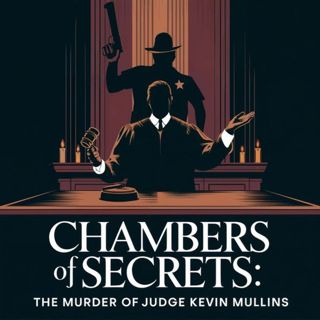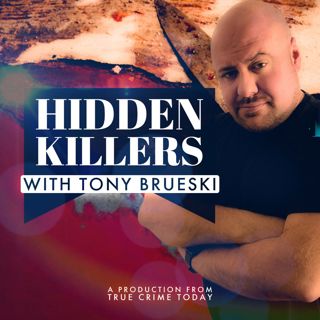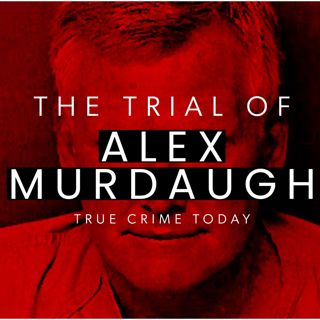
FBI Expert Robin Dreeke: The Charity Beallis Case Defies Simple Narratives — Here's Why
True Crime Today concludes its interview series on the Charity Beallis case with former FBI special agent Robin Dreeke examining why this case resists the simple domestic violence framing many outlets have applied.Charity Beallis wrote publicly that she was a victim. She claimed she feared for her life. But the documented record shows allegations cutting in multiple directions — not just one.Randall Beallis pled guilty to misdemeanor battery. His previous wife Shawna died from a gunshot wound in 2012, ruled a suicide. But Charity had a 2013 arrest for allegedly pointing a firearm at a man. Her own father petitioned for custody of her child, alleging she was dangerous. And according to a 2021 police report, that same father allegedly told investigators Charity confessed to shooting Shawna.Randy Powell later told media he never said Charity was involved — only that "she knew who did it." That's a significant contradiction.Robin Dreeke spent 32 years in federal law enforcement. He's seen cases that looked simple on the surface but weren't. In this interview, he examines how investigators handle situations where both parties have documented allegations against them, where witness statements shift, and where the comfortable victim-perpetrator narrative may not fit the evidence.The investigation is ongoing. No arrest has been made. No cause of death has been released. We don't presume to know who is responsible. We only know that Eliana and Maverick are gone.Content on this site is based on publicly available information and reflects commentary and opinion. All individuals are presumed innocent until proven guilty. Nothing published here constitutes legal, medical, or professional advice.#TrueCrimeToday #CharityBeallis #RobinDreeke #FBI #ElianaAndMaverick #RandallBeallis #BonanzaArkansas #TrueCrime2025 #ComplexCases #CrimeAnalysisJoin Our SubStack For AD-FREE ADVANCE EPISDOES & EXTRAS!: https://hiddenkillers.substack.com/Want to comment and watch this podcast as a video? Check out our YouTube Channel. https://www.youtube.com/@hiddenkillerspodInstagram https://www.instagram.com/hiddenkillerspod/Facebook https://www.facebook.com/hiddenkillerspod/Tik-Tok https://www.tiktok.com/@hiddenkillerspodX Twitter https://x.com/tonybpodListen Ad-Free On Apple Podcasts Here: https://podcasts.apple.com/us/podcast/true-crime-today-premium-plus-ad-free-advance-episode/id1705422872
10 Jan 12min

BREAKING: Attorney Eric Faddis on Mickey Stines Recusal Fight — Will Judge Cohron Be Removed?
The Mickey Stines murder case is frozen — and the reason is a video nobody knew existed until now. Defense attorney and former prosecutor Eric Faddis joins True Crime Today to break down the recusal motion that could change everything.Former Letcher County Sheriff Mickey Stines is charged with murdering District Judge Kevin Mullins in his courthouse chambers in September 2024. The shooting was captured on video. The defense isn't disputing Stines pulled the trigger — they're arguing he was legally insane. But now, before any of that gets argued in front of a jury, the defense is fighting to remove the judge.According to court filings, Special Judge Christopher Cohron was filmed seated inches from Mullins at a Kentucky Judicial Commission on Mental Health meeting — seven days before Mullins was killed. The defense claims Cohron never disclosed this. They're now arguing that his rulings — blocking the psychiatric evaluation from being unsealed, barring it from the bond hearing — show an appearance of bias that cannot stand in a case where mental health is the entire defense.Eric Faddis has been on both sides of fights like this. He walks us through the legal standard for recusal, what happens if Cohron denies the motion, and how this could escalate to Kentucky's Chief Justice. We also get into the venue battle, the death penalty decision that still hasn't been made, and what fifteen months of procedural gridlock tells us about how the system handles a case this tangled.#MickeyStines #TrueCrimeToday #EricFaddis #JudgeCohron #KevinMullins #RecusalMotion #KentuckyMurder #TrueCrimeNews #CourthouseShooting #CriminalJusticeJoin Our SubStack For AD-FREE ADVANCE EPISDOES & EXTRAS!: https://hiddenkillers.substack.com/Want to comment and watch this podcast as a video? Check out our YouTube Channel. https://www.youtube.com/@hiddenkillerspodInstagram https://www.instagram.com/hiddenkillerspod/Facebook https://www.facebook.com/hiddenkillerspod/Tik-Tok https://www.tiktok.com/@hiddenkillerspodX Twitter https://x.com/tonybpodListen Ad-Free On Apple Podcasts Here: https://podcasts.apple.com/us/podcast/true-crime-today-premium-plus-ad-free-advance-episode/id1705422872
9 Jan 15min

Nick Reiner's Legal Road Ahead — Three Battles, One Outcome, No Way Home
Today we're breaking down everything you need to know about what comes next in the Nick Reiner case.Alan Jackson quit as Nick's attorney this morning — but not before delivering a statement that sounded more like a closing argument than a goodbye: "Nick Reiner is NOT guilty of murder under California law. Print that." Three weeks of investigation. Ten sealed subpoenas. And now he's gone.Here's what that statement actually means. California's insanity defense works in two phases. First, the jury decides guilt based on the evidence. Then — if guilty — a second trial determines whether the defendant was legally insane at the time of the crime. That's where Jackson's words apply. Under the M'Naghten Rule, the defense must prove Nick couldn't understand what he was doing or couldn't tell right from wrong at the exact moment of the killings. Less than one percent of defendants plead insanity. Only about a quarter succeed.Nick is now represented by Deputy Public Defender Kimberly Greene, who met him for approximately thirty seconds before the hearing. But the LA County Public Defender's Office has one of the best capital case records in the country — between 2006 and 2015, only one of their clients was sentenced to death out of thirty appeals.Here's what most people miss: even if the insanity defense works, Nick doesn't walk free. He goes to a state psychiatric hospital — potentially for life. Facilities where the DOJ found civil rights violations and patient murders.The insanity defense isn't an escape hatch. It's a different kind of cage. And whether Nick goes to prison or Patton State Hospital, he's not coming back.#NickReiner #RobReiner #TrueCrimeToday #InsanityDefense #CaliforniaLaw #MurderCase #AlanJackson #PublicDefender #CriminalJustice #ReinerCaseJoin Our SubStack For AD-FREE ADVANCE EPISDOES & EXTRAS!: https://hiddenkillers.substack.com/Want to comment and watch this podcast as a video? Check out our YouTube Channel. https://www.youtube.com/@hiddenkillerspodInstagram https://www.instagram.com/hiddenkillerspod/Facebook https://www.facebook.com/hiddenkillerspod/Tik-Tok https://www.tiktok.com/@hiddenkillerspodX Twitter https://x.com/tonybpodListen Ad-Free On Apple Podcasts Here: https://podcasts.apple.com/us/podcast/true-crime-today-premium-plus-ad-free-advance-episode/id1705422872
9 Jan 19min

Nick Reiner Insanity Defense EXPLAINED — What California Law Actually Requires
Today we're breaking down the defense strategy everyone's talking about — and why it almost never works.Alan Jackson made his intentions clear before walking away from Nick Reiner's case: "Nick Reiner is NOT guilty of murder under California law." Translation: insanity defense.Nick was reportedly being treated for schizophrenia at the time he allegedly killed his parents, Rob Reiner and Michele Singer Reiner. TMZ reports a schizoaffective disorder diagnosis. His medication was changed weeks before the killings, and sources describe his behavior as "erratic and dangerous."But California doesn't care if you're mentally ill. It cares if you were legally insane at the exact moment of the crime. That's the M'Naghten Rule — and it's brutal. The defense must prove Nick either didn't understand what he was doing or couldn't tell right from wrong in that specific instant.Less than one percent of defendants try this defense. Only about a quarter succeed.Attorney and former prosecutor Eric Faddis joins us to explain how California's insanity defense actually works — the two-phase trial process, how medication changes factor in, and what evidence prosecutors will use to argue Nick knew exactly what he was doing.We also examine the addiction angle. Nick has a documented history of cocaine and stimulant abuse. California recognizes "settled insanity" from long-term drug use — but psychosis from voluntary intoxication at the time of the crime doesn't qualify. How do these two factors interact?If the defense wins, Nick goes to a state psychiatric facility. If it loses, he faces life in prison or worse.Here's what you need to know about the hardest defense in criminal law.#NickReiner #RobReiner #InsanityDefense #TrueCrimeToday #CaliforniaLaw #Schizophrenia #MurderCase #MNaghtenRule #LegalExplainer #MentalHealthJoin Our SubStack For AD-FREE ADVANCE EPISDOES & EXTRAS!: https://hiddenkillers.substack.com/Want to comment and watch this podcast as a video? Check out our YouTube Channel. https://www.youtube.com/@hiddenkillerspodInstagram https://www.instagram.com/hiddenkillerspod/Facebook https://www.facebook.com/hiddenkillerspod/Tik-Tok https://www.tiktok.com/@hiddenkillerspodX Twitter https://x.com/tonybpodListen Ad-Free On Apple Podcasts Here: https://podcasts.apple.com/us/podcast/true-crime-today-premium-plus-ad-free-advance-episode/id1705422872
9 Jan 15min

Uvalde Trial Day 3: Teacher's Testimony THROWN OUT — Prosecution Loses Key Witness
The prosecution's case took a devastating hit Thursday. Judge Sid Harle struck Stephanie Hale's entire testimony from the record in the Adrian Gonzales trial. The jury has been instructed to disregard everything the former Robb Elementary teacher said — including her account of seeing the gunman on the south side of campus and her testimony about children arming themselves with safety scissors.Hale returned to the stand Thursday for cross-examination. Defense attorney Jason Goss exposed inconsistencies between her courtroom testimony and what she told a Texas Ranger four days after the massacre. Hale admitted it was "kind of implied" she saw the shooter based on dust clouds — not the specific sighting she described Tuesday."There's no doubt that this was crucial to the defense strategy," Judge Harle said before striking the testimony.Three days into the only criminal trial from the Uvalde massacre, the prosecution has been called "negligent," lost a key witness, and watched their own DA testify about failures in witness prep. Gonzales faces 29 counts of child endangerment. Trial continues Friday.#HiddenKillers #AdrianGonzales #UvaldeTrial #RobbElementary #TrueCrime #Uvalde #Justice #SchoolShooting #Breaking #TestimonyJoin Our SubStack For AD-FREE ADVANCE EPISDOES & EXTRAS!: https://hiddenkillers.substack.com/Want to comment and watch this podcast as a video? Check out our YouTube Channel. https://www.youtube.com/@hiddenkillerspodInstagram https://www.instagram.com/hiddenkillerspod/Facebook https://www.facebook.com/hiddenkillerspod/Tik-Tok https://www.tiktok.com/@hiddenkillerspodX Twitter https://x.com/tonybpodListen Ad-Free On Apple Podcasts Here: https://podcasts.apple.com/us/podcast/true-crime-today-premium-plus-ad-free-advance-episode/id1705422872
9 Jan 18min

Nick Reiner Attorney WITHDRAWS — Alan Jackson Says "NOT Guilty" on Way Out the Door
Today in the Nick Reiner case: his defense just imploded.Alan Jackson, the criminal defense attorney who took Nick's case within hours of his January 6th arrest, told a Los Angeles judge he had "no choice" but to withdraw. He cited circumstances "beyond Nick's control." Sources tell Deadline that money is the issue — but Jackson's exit statement tells a different story.Standing outside the courthouse, Jackson declared: "Pursuant to the laws of California, Nick Reiner is NOT guilty of murder. Print that." That's not a withdrawal statement. That's a closing argument.Nick is now represented by LA County Public Defender Kimberly Greene, who told reporters she'd had about thirty seconds with her new client before the hearing. She said she'd had no contact with the Reiner family and didn't believe they knew Jackson was leaving.On today's episode, attorney and former prosecutor Eric Faddis explains what this withdrawal actually means. What happens to the ten sealed subpoenas Jackson's team issued? Does Greene inherit his investigation? How does a public defender prepare for a capital case on this timeline?We also look at who's prosecuting: Deputy DA Habib Balian, who handled the Menendez resentencing and secured a conviction against Robert Durst. Does the defense chaos give him an opening?Arraignment is now February 23rd. No plea has been entered. The insanity defense is being signaled loudly. And the man accused of killing Rob Reiner and Michele Singer Reiner just lost his hand-picked legal team.This case is moving fast. Here's what you need to know today.#NickReiner #RobReiner #TrueCrimeToday #AlanJackson #ReinerMurders #BreakingNews #MurderCase #LACounty #CriminalDefense #TrueCrimeNewsJoin Our SubStack For AD-FREE ADVANCE EPISDOES & EXTRAS!: https://hiddenkillers.substack.com/Want to comment and watch this podcast as a video? Check out our YouTube Channel. https://www.youtube.com/@hiddenkillerspodInstagram https://www.instagram.com/hiddenkillerspod/Facebook https://www.facebook.com/hiddenkillerspod/Tik-Tok https://www.tiktok.com/@hiddenkillerspodX Twitter https://x.com/tonybpodListen Ad-Free On Apple Podcasts Here: https://podcasts.apple.com/us/podcast/true-crime-today-premium-plus-ad-free-advance-episode/id1705422872
9 Jan 12min

The Reiner Family Tragedy: Psychotherapist Shavaun Scott on Schizophrenia, Failed Treatment, and a System With No Answers
Rob and Michele Reiner are dead. Their son Nick is charged with their murders. And millions of families watching this case are seeing their own nightmare reflected back at them.Psychotherapist Shavaun Scott joins True Crime Today to examine what the Reiner family was really facing — and why their tragedy is a warning about a mental health system that keeps failing the people who need it most.The Reiners weren’t negligent parents. They were desperate ones. For seventeen years, they tried to help a son who was struggling with addiction and, reportedly, schizophrenia. Eighteen treatment programs. World-class facilities. Unlimited resources. Rob Reiner himself admitted they felt lost, that they trusted professionals who couldn’t deliver results, that they feared the tragic ending was coming.It came. And they’re not alone.Shavaun explains what families face when someone they love has a severe mental illness. Why love and money aren’t enough. Why the treatment industry so often fails. Why schizophrenia gets missed when addiction is the visible problem. She breaks down what happens when medication changes go wrong — sources say Nick became “erratic and dangerous” after a medication switch weeks before the killings.We also examine why families can’t protect themselves. Conservatorship was reportedly in the works when Rob and Michele died. The legal system moves slowly. Mental illness doesn’t wait. Shavaun explains the barriers families face and why intervention comes too late far too often.This case is getting attention because of who the Reiners were. But this story is playing out in families across America every single day — families with far fewer resources and even fewer options.#NickReiner #RobReiner #MicheleReiner #ShavaunScott #TrueCrimeToday #Schizophrenia #MentalHealth #TrueCrime #FamilyTragedy #MentalHealthCrisisJoin Our SubStack For AD-FREE ADVANCE EPISDOES & EXTRAS!: https://hiddenkillers.substack.com/Want to comment and watch this podcast as a video? Check out our YouTube Channel. https://www.youtube.com/@hiddenkillerspodInstagram https://www.instagram.com/hiddenkillerspod/Facebook https://www.facebook.com/hiddenkillerspod/Tik-Tok https://www.tiktok.com/@hiddenkillerspodX Twitter https://x.com/tonybpodListen Ad-Free On Apple Podcasts Here: https://podcasts.apple.com/us/podcast/true-crime-today-premium-plus-ad-free-advance-episode/id1705422872
9 Jan 58min

Charity Beallis Investigation: FBI Veteran Explains What "No Ongoing Threat" Typically Means
True Crime Today brings back former FBI special agent Robin Dreeke to analyze the investigative signals in the Charity Beallis case — what documented law enforcement actions may indicate without speculating on outcomes.Over a month after Charity Beallis and her six-year-old twins were found dead from gunshot wounds in their Bonanza, Arkansas home, the investigation remains officially open with no named suspect. But the details that have emerged create a picture worth examining.Twelve search warrants. Multiple agencies involved — including the Secret Service and Homeland Security. A public statement that there's "no ongoing threat to the public." And a reported dumpster discovery that connected discarded family belongings to an address associated with Randall Beallis.Robin Dreeke spent over three decades in federal law enforcement, including running the FBI's Behavioral Analysis Program. He knows how to read an investigation from available information — the language choices, the pace, the resource allocation, the things that get said and the things that don't.When Charity's adult son reportedly told a detective about the dumpster find, the detective reportedly asked, "How did you find out?" What might that response indicate about information control? When investigators say there's no public threat but won't name a suspect, what does that language typically signal? Why would federal agencies assist in what appears to be a local case?This analysis examines investigative patterns without presuming any individual's guilt.Content on this site is based on publicly available information and reflects commentary and opinion. All individuals are presumed innocent until proven guilty. Nothing published here constitutes legal, medical, or professional advice.#TrueCrimeToday #CharityBeallis #RobinDreeke #FBI #BonanzaArkansas #RandallBeallis #ElianaAndMaverick #CrimeInvestigation #TrueCrime2025 #InvestigationAnalysisJoin Our SubStack For AD-FREE ADVANCE EPISDOES & EXTRAS!: https://hiddenkillers.substack.com/Want to comment and watch this podcast as a video? Check out our YouTube Channel. https://www.youtube.com/@hiddenkillerspodInstagram https://www.instagram.com/hiddenkillerspod/Facebook https://www.facebook.com/hiddenkillerspod/Tik-Tok https://www.tiktok.com/@hiddenkillerspodX Twitter https://x.com/tonybpodListen Ad-Free On Apple Podcasts Here: https://podcasts.apple.com/us/podcast/true-crime-today-premium-plus-ad-free-advance-episode/id1705422872
9 Jan 14min






















